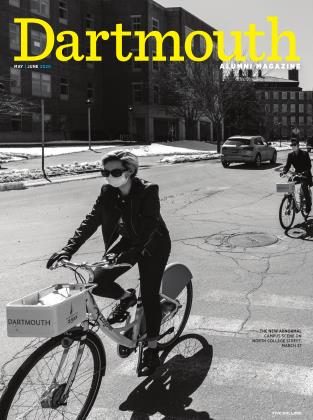A Quest for Antibodies
Engineering lab shifts focus to investigate the coronavirus.
MAY | JUNE 2020 Charlotte AlbrightEngineering lab shifts focus to investigate the coronavirus.
MAY | JUNE 2020 Charlotte AlbrightA Quest for Antibodies
notebook
CAMPUS
EUREKA!
new findings and research
MEDICINE
Engineering lab shifts focus to investigate the coronavirus.
Six years ago, when Joshua Alex Weiner, Adv ’14, earned his Ph.D. in biochemistry, he could not have foreseen the worldwide pandemic that lay ahead. Now he’s managing a research project in the lab of Thayer engineering professor Margie Ackerman, investigating antibodies that fight the deadly coronavirus.
The duo made a sudden pivot from similar work they had been doing on polio and HIV.
“One day in early March I was late coming back to my office and found four Ph.D. students at my door wanting to talk to me about their plans to contribute to the Covid-19 pandemic,” says Ackerman. “They saw the importance and recognized what they could personally contribute. The troops gathered and we went to work.”
In collaboration with the Geisel School of Medicine, the Ackerman lab is analyzing samples collected from patients at Dartmouth-Hitchcock Medical Center who have recovered from the disease.
“If you’ve gotten sick and healthy again, you did a good job fighting the infection and your immune system’s going to tell us something about how it did that,” says Weiner. With colleagues from the University of Texas, his team is studying the so-called spike protein, a prime culprit in infection, and learning what the new coronavirus does—or does not—have in common with its less lethal cousins.
“We’re taking bits and pieces of Covid-19 and those same bits and pieces of the spike protein of other coronaviruses and putting those into an assessment tool,” says Weiner. “We want to find out, when people get better, which antibodies they are generating and what those antibodies are targeting.”
Unlike many other labs, the Ackerman team is looking at not only serum samples, but also mucosal deposits favored by the new coronavirus in the nasal and intestinal tracts. Their data will help other scientists develop Covid-19 therapies and vaccines. Ackerman is financing the project through the lab’s discretionary account as she applies for external funding. “It is unclear what the scope of testing will be and how much money will ultimately be needed,” she says.
Charlotte Albright
7
Percentage of Americans who read an article from a fake news site during 2018 midterm campaigns, according to research by government prof Brendan Nyhan
QUOTE/UNQUOTE
“People normally just think about themselves; they don’t think that, if everybody is acting as they act, we end up with nobody thinking about the public good.”
—Math professor Feng Fu, who uses mathematical models to determine how to promote human kindness
Roving Eye
Mars—land of lakes?
»> For the past several years, NASA’s Curiosity rover has been sending images back to Earth suggesting that a long, long time ago, the Red Planet was inhabited. Not by people, but by microbes. Assistant professor of earth sciences Marisa Palucis spends much of her time peering at the rover’s selfies, finding evidence of ancient, life-supporting oases. “It’s really exciting, because a lot of us have been looking at this one crater, called Gale Crater,” says Palucis, a geomorphologist who started at Dartmouth in 2017. “Gale was likely connected to a very large groundwater system and surface water. This whole region of Mars would have been covered in lakes 3.5 billion years ago. That’s an important finding, that the reservoir of near-surface and surface water on Mars was probably quite large.” Now almost all the water on Mars exists as ice or atmospheric vapor. Climate change, Palucis notes, is not unique to Earth. “Early on, I think the two planets were more similar,” she says. “But they diverged over time.” —C.A.
Gender Politics
Women get out the vote.
»> Politicians and pundits, take note: The gender gap is real. Women are likely to outvote men by 10 million ballots in November. That hasn’t always been the case, says economics professor Elizabeth U. Cascio. “My grandmother, born in the 1930s, used to stay in the car while my grandfather went to vote,” she notes in a new paper on the 100-year history of the American female voter. “My mom votes as often as my dad.” Cascio finds that the higher turnout by women has favored Democratic candidates over time. Many women left the Republican Party during the Reagan years, when leaders failed to support the Equal Rights Amendment, opposed abortion, and embraced the conservative view that a woman’s place was in the home, not the workforce. Today, though, women “occupy a uniquely powerful place in the American electorate,” according to Cascio and coauthor Na’ama Shenhav. —C.A.
 View Full Issue
View Full Issue
More From This Issue
-
 Feature
FeatureThe Front Lines
MAY | JUNE 2020 By LISA FURLONG, C.J. Hughes ’92 -
 Sports
SportsCapital Achievement
MAY | JUNE 2020 By Matthew Mosk ’92 -
 notebook
notebookMission, Interrupted
MAY | JUNE 2020 By LISA KOCIAN ’94 -
 notebook
notebookWhat’s In a Name?
MAY | JUNE 2020 By LISA KOCIAN ’94 -
 readers react
readers reactYOUR TURN
MAY | JUNE 2020 -
 notebook
notebookDad Thad
MAY | JUNE 2020
Charlotte Albright
Notebook
-
 notebook
notebookBalancing Act
JULY | AUGUST 2017 -
 notebook
notebookOutta Here!
JULY | AUGUST 2017 -
 notebook
notebookBaccalaureate Bling
SEPTEMBER | OCTOBER 2018 -
 notebook
notebookBY THE NUMBERS
SEPTEMBER | OCTOBER 2019 -
 notebook
notebookPandemic Days
JULY | AUGUST 2020 -
 notebook
notebookA Tragedy Runs Through It
MARCH | APRIL 2021 By RICHARD BABCOCK ’69



